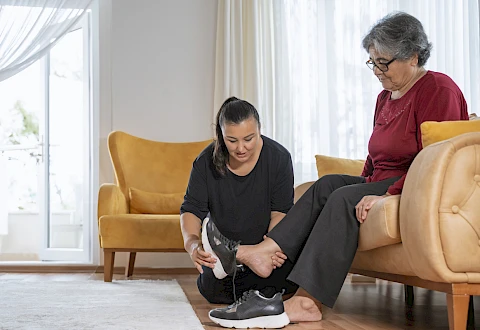
Winter can be a beautiful season, but it also presents unique challenges. Cold temperatures, icy conditions, and even indoor environments can pose risks to the health and safety of our elderly loved ones. As caregivers, being prepared and vigilant can help ensure their well-being. Senior Helpers Smithtown shares a checklist of essential safety tips to help you navigate the cold weather with your senior family members.
The Risks of Cold Weather for Seniors
Seniors are often more vulnerable to cold weather due to several factors. As we age, our bodies become less efficient at regulating temperature. This makes it harder for seniors to stay warm, increasing their risk of cold-related health issues. Reduced mobility and certain medical conditions can also contribute to this heightened vulnerability. Common cold-related illnesses in seniors include hypothermia, where the body loses heat faster than it can produce, and frostbite, which is the freezing of skin and underlying tissues. These conditions can significantly impact seniors, leading to severe health problems or even becoming life-threatening if not addressed promptly.
Dressing for Warmth and Safety
To keep seniors safe and comfortable during colder months, dressing appropriately is dire.
- Layer clothing accordingly. Start with a moisture-wicking base layer to keep the skin dry, followed by an insulating layer like wool or fleece, and top it off with a waterproof and windproof outer layer.
- Use hats, gloves, and scarves. A significant amount of body heat is lost through the head and extremities, making these accessories essential.
- Ensure the use of proper footwear. Shoes with non-slip soles reduce the risk of falls on icy surfaces. Insulated boots will keep their feet warm and dry, which is vital in maintaining overall body warmth.
Fall Prevention Strategies
Winter conditions can significantly increase the risk of falls for seniors. Take precautions both indoors and outdoors to minimize this risk. Inside the home, keep floors dry and free from clutter. For outdoor areas, ensure walkways are clear of snow and ice, and use salt or sand to improve traction. Installing grab bars in areas such as entrances and bathrooms can provide additional support. Encourage the use of walking aids when necessary, especially on potentially slippery surfaces.
Maintaining a Warm Home Environment
Keeping the home environment warm and energy-efficient is essential for seniors' health during winter. Regular checks and maintenance of heating systems can prevent sudden breakdowns when they're needed most. Ensure windows and doors are properly sealed to prevent heat loss and drafts. Adding extra warmth without significantly increasing energy bills can be achieved by layering blankets on beds and having throws available in living spaces.
Recognizing Signs of Cold-Related Illnesses
Being aware of the signs of cold-related illnesses can help in early detection and treatment. Hypothermia symptoms include shivering, slurred speech, and confusion. Frostbite can be identified by numbness, red, white, or grayish-yellow skin, and a hard or waxy feel to affected areas. Seniors may not feel cold as acutely, so symptoms might be subtle. Always seek medical attention if you suspect hypothermia or frostbite.
Senior Helpers Smithtown Offers Professional Assistance
Caring for seniors during the winter months requires an extra level of attention and preparation. By dressing appropriately, preventing falls, maintaining a warm home, and knowing the signs of cold-related illnesses, caregivers can help ensure the safety and comfort of their elderly loved ones. If you need professional assistance, contact us at Senior Helpers Smithtown. We proudly serve seniors in Central Islip, Port Jefferson, Stony Brook, and Centereach, ensuring they receive the care and support they need all year round.